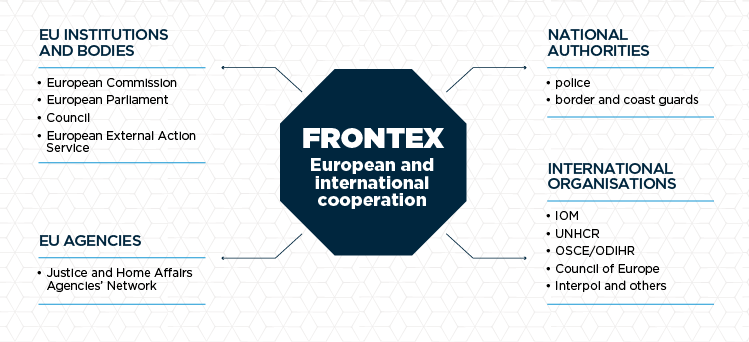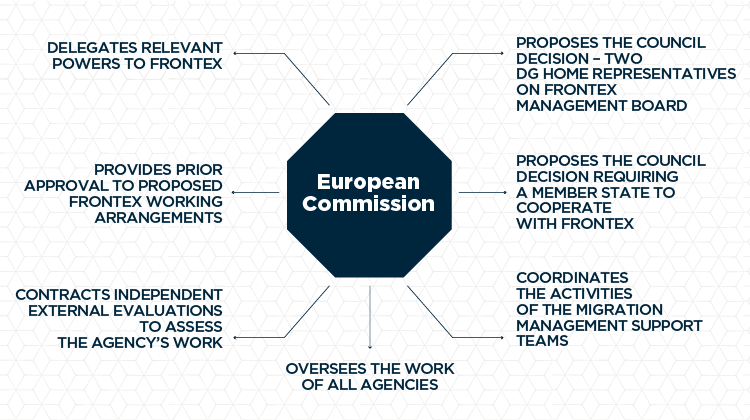Cooperation within the EU – its institutions,
bodies, offices, and agencies - is crucial for Frontex in and outside the EU.
From Brussels, the seat of many EU institutions, the European Commission
defines the core parameters for Frontex international cooperation, while the
European External Action Service helps in setting priorities in EU external
relations. Frontex activities are fully aligned with EU external policies and
closely coordinated with the Commission, the European External Action Service
and relevant EU delegations. Frontex is also part of the EU Justice
and Home Affairs Agencies’ Network that includes
agencies working together for the safety of European citizens.
EU institutions

European Commission
European Commission supervises and monitors the implementation of the EU treaties and legislation, which also means that it oversees the work of EU agencies, including that of Frontex. For this reason, two representatives of Directorate-general for Migration and Home Affairs (DG HOME) represent the Commission on the Frontex Management Board. The European Border and Coast Guard Regulation also requires that the European Commission is kept regularly informed about the agency’s activities.
Frontex falls within the responsibility and portfolio of its ‘parent DG’, DG HOME, and the European Commissioner for Migration, Home Affairs and Citizenship. In practice, Frontex also cooperates with many of the directorates and bodies within the European Commission including on topics related to enlargement and implementation of technical assistance projects in non-EU countries, neighbourhood, development-related issues, maritime and fisheries affairs, as well as taxation and customs.
Frontex’s primary role is to support the implementation of the existing policies, but it also contributes to various areas of Commission work, particularly by providing its technical expertise. This can include:
- input to consultations on legislative proposals or
- regular attendance and contribution to Commission-run expert groups and networks, such as the European Network on Migration.
In addition, the European Commission has a number of specific and important powers stemming from the European Border and Coast Guard Regulation. In situations at the external borders requiring urgent action, as part of the procedure laid down in Article 19, the Commission may propose decisions to be taken by the Council requiring a Member State to cooperate with the agency in the implementation of measures to mitigate risks at the external borders.
The Commission may delegate relevant powers to Frontex when it implements border security related parts of the Framework Programme for Research and Innovation. It also provides prior approval to proposed Frontex working arrangements with EU or non-EU institutions, agencies, organisations, or countries.
Every four years, the Commission contracts independent external evaluations to assess the agency’s work, results achieved and possible need to modify its mandate.
Finally,
the European Commission also has an important role in coordinating the
activities of the migration management support teams deployed in hotspot
areas.

European Parliament
As one of the two bodies to exercise the legislative function of the EU, the European Parliament, along with the Council of the European Union, negotiates and adopts the legislative mandates of the EU agencies, including that of Frontex.
The
European Border and
Coast Guard Regulation clearly sets out, in its
Article 7 on accountability that:

The European Parliament will also have a greater role in the appointment procedure of the Frontex Executive Director.
Moreover, as specified in Article 112 of the Regulation, the European Parliament and the national parliaments may cooperate to ensure that the scrutiny functions of the European Parliament over the agency and of the national parliaments over their respective national authorities are effectively exercised.
Read
more about accountability at
Frontex.
Council
Together with the European Parliament, the Council of the European Union is the institution that adopts EU legislation. Along with the Parliament, it negotiates and adopts the legislative mandates of all EU agencies, including that of Frontex.
The
European Border and
Coast Guard Regulation sets out, in its Article 7
on accountability, that:

The Frontex mandate also defines a number of reporting and notification obligations related to the Council. In particular, the agency provides the Council with:
- risk analysis products,
- vulnerability assessment results,
- financial and operational needs, and
- the annual activity and single programming documents.
Frontex may also be requested to present its work or provide technical expertise in support of the Council’s deliberations. For instance, the Frontex Executive Director is regularly invited to attend, alongside the ministers of the Member States, the meetings of the Justice and Home Affairs Council. The agency may also be invited to participate at Council committee or working party level, particularly:
- the Mechanism for the External Dimension of Migration process,
as well as when appropriate, at ministerial meetings.
Finally, the Council has an important role in the procedure laid down in Article 19 of the European Border and Coast Guard Regulation for situations at the external borders requiring urgent action. In cases where control of the external borders is rendered ineffective to such an extent that it risks jeopardising the functioning of the Schengen area, the Council, on the basis of a Commission proposal, may adopt a decision identifying measures to mitigate those risks. Frontex and the Member State concerned would then be required to cooperate in the implementation of those measures.
European External Action Service
The European External Action Service (EEAS) is an important partner for the agency in all its international cooperation activities, in close coordination with the European Commission. Regular staff-to-staff meetings, as well as exchange at the executive level, help to ensure that Frontex cooperation activities outside of the EU go hand-in-hand with the Union’s foreign and security policy.
Frontex relies on the expertise and support of the EEAS and works closely with EU Delegations and Common Security and Defence (CSDP) missions, particularly through liaison officers in non-EU countries. In turn, the agency supports the development of EU’s external policies with operational knowledge and advice on border issues, including in the context of EU’s high-level dialogues on migration and security, migration compacts and other initiatives.
Cooperation with CSDP missions and operations aims to ensure the promotion of European integrated border management standards and focus on situational awareness and risk analysis. The agency concluded working arrangements with:
- operation EUNAVFOR MED IRINI.
Frontex also works closely with the EU Intelligence Analyses Centre and the EU Satellite Centre – two entities under the EU’s Common Foreign and Security Policy that support informed decision making. Both entities contribute to the European situational picture and a common pre-frontier intelligence picture and provide data for Frontex risk analysis.